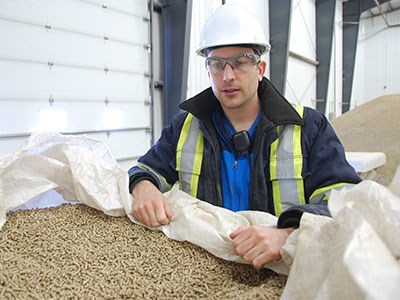A New Liskeard-area wood pellet plant is now in full production in preparation to start exporting tonnes of industrial-grade pellets to European power plant clients.
K.D. Quality Pellets, located on Highway 11 north of town, went into 24-hour production in January and will be expanding later this year with additional equipment arriving from Germany.
The plant is running four shifts and has increased its full and part-time workforce from 10 to 17.
The shipping plan is to truck pellets from the Harley Township location a few kilometres north to Englehart and then rail it out to an unidentified saltwater port for shipment overseas.
“Most of our production is going to an unidentified buyer,” said operations manager Marc Hamelin.
The buyer is making all the logistical arrangements in ordering the rail cars to arrive in Earlton and use the Ontario Northland Railway to connect with the Canadian National.
Hamelin could not disclose the final destination for their pellets.
About 90 per cent of their output is earmarked for power plant consumption.
The plant’s production is now at its 45,000-tonne annual capacity in what is the first of a two-phase project.
A second $7.5-million expansion is tentatively scheduled for completion for December that will significantly boost production to 200,000 tonnes, making both premium and industrial grade pellets with a bagging line.
Four Kahl pellet presses will be arriving from Europe this year to supplement the single press now in use.
The pellets are produced to a recipe and a particular specification for European customers.
“Right now, we’re making our pellets out of a 50 per cent mix of hardwood (poplar and birch) and softwood (spruce, pine, fir),” said Hamelin, most of it sourced from local sawmill residue.
The company was also awarded an annual Crown wood allotment of 90,000 cubic metres by the Ontario government in 2011.
Hamelin and his boss, Ken Doupe, were involved in the logging industry before seguing into this venture and built the mill from scratch.
“We did a feasibility study at the beginning with a consultant to see if it was worthwhile to pursue that project,” said Hamelin, a graduate of College Boreal’s forestry, fish and wildlife program.
In searching for interested buyers, Hamelin said most of the North American production facilities were shipping to Europe, “so we knew that’s where we had to focus.”
Domestic sales in Canada and the U.S. were forecasted to be marginal.
During the plant’s construction in the fall of 2012, the building was sized to be scalable to accommodate increased production.
After production began on June 21, 2013, the first few batches sold locally to greenhouses and for some industrial use in Ontario.
The plant is not currently bagging for hardware stores, just providing bulk supply for industrial clients, including one-tonne tote bags.




